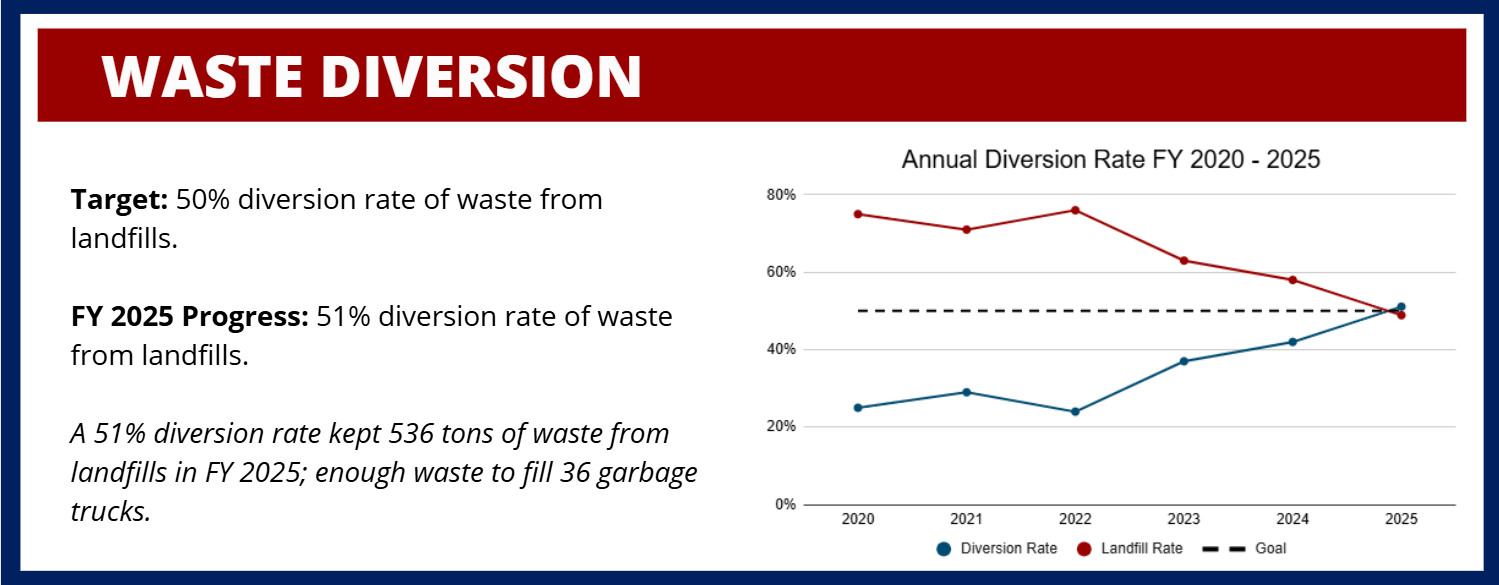Catholic University is committed to reducing the amount of waste generated and disposed of on campus.

How do we achieve our target? Do your part! Check out the information below on how to recycle and compost on campus, and read our blog post about how to reduce the amount of waste you create!
Recycling
At Catholic University, recycle paper, cardboard, glass, plastic, and metal in the blue bins. Catholic University uses single stream recycling, so all recyclables go into the same bin. Recycling Tips:
- Empty and rinse plastic or glass food containers before recycling them.
- Only clean paper and cardboard are recyclable (no greasy pizza boxes!).
- If you aren't sure if something is recyclable, throw it away. It is better to put it in the trash than to contaminate the recycling bin.
Off campus? Check out DC's waste sorting toolkit and waste sorting game.
Composting
At Catholic University, compost food waste and paper and cardboard that states it is compostable in the Pryz and Garvey Hall. Composting Tips:
- All food waste - vegetables, fruits, grains, meats, dairy - is compostable.
- Only compost paper or cardboard if the item clearly states that it is compostable.
- Collect your compost in a closed container or sealed bag. Keeping your compost in a refrigerator or freezer will ensure it does not smell or attract pests.
- Empty your compost twice per week, even if it is not full.
- If you aren't sure if something is compostable, throw it away. It is better to put it in the trash than to contaminate the compost bin.
Off campus? Check out DC's food waste drop off locations, including one at the Brookland Farmer's Market every Saturday morning.
Donating
For items you can donate, such as food, clothing, furniture, books, electronics, etc. check out our Donation Guide.
Other Common Items
Check out our tips below for disposing of common items that cannot be donated and should not go in the trash, recycling, or composting.
-
Batteries
Batteries should not be placed in the trash or recycling. There are battery collection boxes available at the front desk of The Nest in the Pryzbyla Center and in the lobby of Mullen Library. Students, staff, and faculty may drop off used batteries in the battery recycling boxes. -
Electronics
Electronics should not be placed in the trash or recycling. The Office of Campus Sustainability hosts a free electronics recycling event at least once per year in the O'Boyle Parking Lot. Students, staff, faculty, and Brookland community members may drop off televisions, computers, tablets, e-readers, mobile phones, printers, computer accessories (keyboards, mice, monitors, speakers, etc.), printers, DVDs, DVRs, VCRs, gaming consoles, and more.
2024/2025 Electronics Recycling Events: To be announced
Off campus, DC hosts electronics recycling events for personally owned items in each ward throughout the year and electronics and household hazardous waste drop-offs occasionally RFK stadium.
Any University owned electronics that are no longer needed should be returned to Asset Management.
-
Ink and Toner
Ink and toner cartridges should not be placed in the trash or recycling. Please send any ink and toner cartridges that need to be disposed to the Power Plant Building on campus (3590 John McCormack Road) with attention to Andrew Wolf via campus mail or hand delivery.

